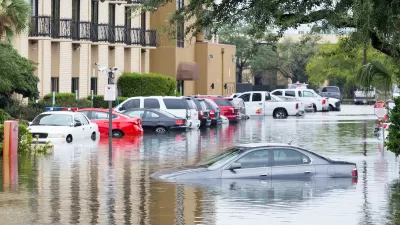The 186-page "Resilient Houston" document was released to the public in the nation's fourth largest city, which is facing numerous environmental stresses.

Andy Olin reports: "On Wednesday [February 12], the city released its 'Resilient Houston' strategy, a robust plan to invest in and strengthen the capabilities of neighborhoods, communities and the entire region to address, withstand and quickly recover from physical, social and economic shocks and stresses."
"Mayor Sylvester Turner unveiled the strategy alongside Chief Resilience Officer Marissa Aho and signed an executive order requiring all city departments to make resilience part of all strategic planning," according to article.
To describe the approach of Houston's new resilience strategy, Olin starts with the issue described as "top of mind" for most Houston residents: flooding.
In the context of resiliency, hurricanes and flooding are examples of acute shocks. Large scale, sudden events that disrupt and endanger life. Other shocks include economic crisis, cyberattacks, terrorism, chemical disasters and extreme heat and drought, among others.
Critically, though, the strategy not only addresses shocks, but also a litany of chronic stresses that make recovery from shocks difficult and that represent hurdles in Houstonians daily lives. The shocks and stresses identified in the strategy are tailored specifically to Houston.
For more news coverage on "Resilient Houston," see an article by Dylan McGuinness and Jasper Scherer for the Houston Chronicle.
FULL STORY: City unveils ‘Resilient Houston,’ its plan to make the city stronger at every level

Planetizen Federal Action Tracker
A weekly monitor of how Trump’s orders and actions are impacting planners and planning in America.

Maui's Vacation Rental Debate Turns Ugly
Verbal attacks, misinformation campaigns and fistfights plague a high-stakes debate to convert thousands of vacation rentals into long-term housing.

Restaurant Patios Were a Pandemic Win — Why Were They so Hard to Keep?
Social distancing requirements and changes in travel patterns prompted cities to pilot new uses for street and sidewalk space. Then it got complicated.

In California Battle of Housing vs. Environment, Housing Just Won
A new state law significantly limits the power of CEQA, an environmental review law that served as a powerful tool for blocking new development.

Boulder Eliminates Parking Minimums Citywide
Officials estimate the cost of building a single underground parking space at up to $100,000.

Orange County, Florida Adopts Largest US “Sprawl Repair” Code
The ‘Orange Code’ seeks to rectify decades of sprawl-inducing, car-oriented development.
Urban Design for Planners 1: Software Tools
This six-course series explores essential urban design concepts using open source software and equips planners with the tools they need to participate fully in the urban design process.
Planning for Universal Design
Learn the tools for implementing Universal Design in planning regulations.
Heyer Gruel & Associates PA
JM Goldson LLC
Custer County Colorado
City of Camden Redevelopment Agency
City of Astoria
Transportation Research & Education Center (TREC) at Portland State University
Jefferson Parish Government
Camden Redevelopment Agency
City of Claremont





























